#gothic essay
Explore tagged Tumblr posts
Text
I am actually going to talk about what I call images, or symbols. It seems to me that in our present great drive—fiction-wise—toward the spare, clean, direct kind of story, we are somehow leaving behind the most useful tools of the writer, the small devices that separate fiction from reporting, the work of the imagination from the everyday account. Of these the far most important, and the most neglected, is the use of symbols; I am using the word loosely, because it has altogether different meanings elsewhere, and yet I hardly know what other word to use ... There must be at least one basic image, or set of images, for each character in a story, a fundamental symbol the writer keeps always in mind; as these images grow the character grows, and the accumulation of material and information about the image slowly makes up the character in the story. Various things belong to a character—a manner of speaking, a manner of moving, a particular emphasis, a group of small physical things—and each of these must take on, like a perfume, the essence of the character they belong to. Just as a tune or a scent can evoke for most of us an entire scene, so the basic image of the character must evoke that entire character and his place in the story. As a result of this, of course, the characters themselves grow apart in the writer’s mind, become entirely separate people, and by the end of a book or a story the writer can no more mistake one for another than he can mistake a can of beans for a pearl necklace.
--Shirley Jackson, "Garlic in Fiction"
#this whole essay has some of the best writing advice i've ever come across#especially for anyone trying to write a mystery/Gothic novel/thriller#i recommend the whole article especially if you're familiar with#the haunting of hill house#the beginning of which she deconstructs in brilliant detail#shirley jackson#writing advice#on writing
272 notes
·
View notes
Text
i like to think goth is a gender in of itself
#goth#gothgoth#gothic#gender#gothgender#i usually just go by nonbinary but gothgender resonates quite a bit tbh#and there is something to be said about the overlap between the trans community and the goth community#and especially with how goth often rejects typical gender norms#idk there's definitely an essay to be written here but im not good at articulating my thoughts#but i dont really get dysphoria from looking more feminine or masculine the way i do if i feel like i look too preppy#and being able to be goth feels like its improved my mental health#idk tho im just someone on the internet throwing words at a wall
884 notes
·
View notes
Text
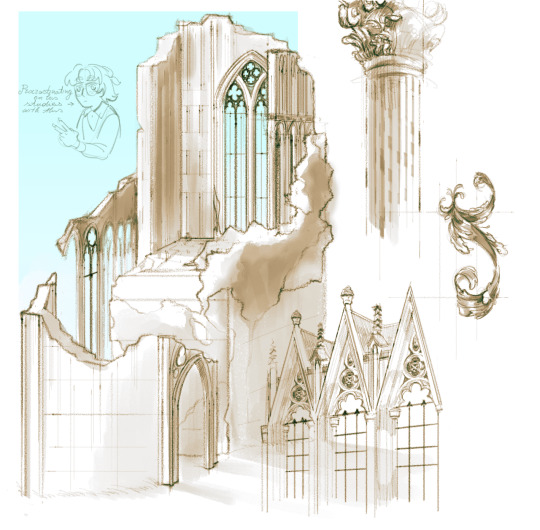
architecture
#[.art]#ignoring the pages I have to read because I was listening to a pathologic video essay so I needed to doodle as it went on#gothic architecture
185 notes
·
View notes
Text
Why set Dracula: 2004 in 2004?

Earlier this week, we revealed that our next project will be Dracula: 2004, an exciting new adaptation of Bram Stoker’s Dracula set in the early Noughties. But the question is, why 2004? It can’t just be for Britney Spears, right?
Well, as much as I love Britney Spears, she’s not the only reason I chose the year 2004 as the setting for this version of Dracula. If you want to read a 1,500 word (!) essay on the advancement of technology, the themes of gothic literature, and why I love Dracula, then you’re in the right place. Buckle in for an outpouring of English-teacher-nerdery (yes, I really am an English teacher in real life!) and prepare to be lectured to.
The thing about Dracula is that it’s already been done to death (pun unintended) a thousand times. You’ve got the classic gore of Hammer Horror; the Ye Olde Copyright Issues of Nosferatu; the romance of Coppola’s remake; the odd (but strangely compelling) Van Helsing, starring Hugh Jackman; and more recently, Renfield and Last Voyage of the Demeter. And that’s not even broaching the world of audio fiction, with Murray Mysteries, RE. Dracula, Dracula: The Danse Macabre and The Holmwood Foundation, all of which came out (or are coming out soon) within the past five years. The point is, the market is absolutely swimming with vampires. We’ve got piles of absolutely fantastic vampire fiction coming out of our ears, even only focusing on Dracula content. So why the hell am I making more?
Well, firstly, I am personally of the belief that you can’t have too much of a good thing. I am a particular fan of the “two cakes” metaphor (pictured below) for the precise reason that there is almost certainly a nerd out there who, like me, will look at yet another Dracula audio drama out there and think “Two cakes!” If you are that person, then congratulations: you are my target audience!
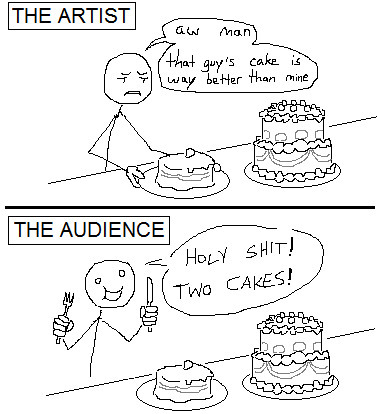
(Image credit to Tumblr user @stuffman)
Secondly, most of the settings for Dracula adaptations appear to fit into one of two settings: original time period, or thereabouts (thinking of Danse Macabre here) or modern day (such as Murray Mysteries). To be absolutely clear, I adore these shows and am not in any way criticising them! But when I was rereading Dracula back in 2022, it occurred to me that there was an untapped market: 2000s nostalgia.
Ah, the smell of hair that has been aggressively hairsprayed and backcombed within an inch of its life! The sheer impracticality of wearing a dress over jeans, and doing it anyway just because it looked cool! The technological gleam of the Blackberry phone’s 5000 different keys, ready to incomprehensibly speed-text at a moment’s notice!
Most people are either old enough to remember this, or young enough to want to. The Noughties were an absolutely fascinating time period, one that many people look back on with a certain degree of fondness (especially considering the current state of the world). It also happens to bear a striking resemblance to the late 19th century, for reasons I am about to explain.
Bram Stoker first published his horror novel Dracula in 1897. At this point in history, Britain was a global powerhouse, having colonised half the world and with the British Empire at its height (and, many would argue, at its worst). Stoker explores one of the contemporary anxieties of the British public in great detail: the fear of the Other. While this is a common theme in most Gothic fiction, Stoker characterises the Other through the villainous Count Dracula, a man from the “uncivilised” Eastern Europe who (literally) drains dry the "honourable" people of Britain, taking advantage of their kindness and generosity. He even goes so far as to “invade” the very island, proceeding to torment and prey upon innocent women, and must be driven back and killed by the "noble" British (and Dutch/American) protagonists. Count Dracula could be said to represent the contemporary British fear that the people they had colonised and exploited would turn on them and thus invade their country.
In 2004, Britain was at war with both Afghanistan and Iraq. This involvement in global politics – particularly so soon after 9/11, in 2001 – resulted in public backlash from multiple directions. Immigration was a topical issue: many Brits rejected the notion of refugees seeking asylum in the UK after escaping these war zones, viewing it as an “invasion” (sadly, not much seems to have changed here). This same disconnect between cause and effect is present in both the public of 1897 and 2004, particularly in the treatment of Roma people (although we have taken a detour away from Stoker's more unpalatable views on this topic).
But British politics are not the only connections we can draw between these two time periods. One of the key Gothic themes is science and technology versus religion and belief, and this theme is very heavily explored throughout Dracula, particularly through the character of Van Helsing. Bram Stoker would have been alive to experience ground-breaking inventions such as the traffic light, the telephone, the lightbulb, the steam turbine and fingerprint classification, all before Dracula was even written. With scientists and engineers learning how to play God at every turn, was it any wonder that authors of Gothic literature were inspired to explore this contrast, in other works like Dr. Jekyll and Mr. Hyde, or Frankenstein?
Similarly, 2004 was a time of exciting innovation, particularly relating to communication (a major motif in Dracula!). Not only was it in the thick of the early digital age, where internet access was fast-becoming universal and most people could now afford to carry a mobile phone, but it also signified the beginning of the social media era: Facebook was in development that year, and Myspace was gaining more users by the day. If you could go back in time and explain to your younger self the sheer scope of impact that social media would one day have on the world, would they believe you?
The sheer, terrifying enormity of change that occurred in both of these eras simply cannot be understated. In my opinion, there’s a reason that Buffy was so popular in the 90s and why Twilight burst into life only a few years later: change brings fear of modernity, fear of modernity brings a craving for tradition, and a craving for tradition needs monsters to feed it. I have altered some of the religions of the core cast in order to better reflect a more diverse modern society (there’s a whole different essay to be written on that choice alone) but the principle stays the same: with light comes shadows.
But wait, there’s more! One key reason why I selected 2004, of all the years, as a setting relates sharply to the social issues of Stoker’s time that I felt could not be adequately explored in a more modern Britain. In 1895, Stoker’s contemporary and acquaintance Oscar Wilde was imprisoned for gross indecency (relating to homosexuality), and one month later, Stoker began to write Dracula. Stoker – possibly to protect his own public image – condemned Wilde and ceased contact with him, but it’s plausible that Wilde’s influence remains within the character of Count Dracula.
Certainly, despite Stoker portraying the Count as a villain, who takes advantage of poor Jonathan Harker, he also writes the strangely possessive line “This man belongs to me!” when the three female vampires attempt to seduce Jonathan (and drain him). Count Dracula is both a man to be feared and repelled by… but also attracted to, a conundrum that Stoker (who many theorise to have been a closeted queer man) would have been intimately familiar with.
This brings us back to 2004, the year after Section 28 was repealed. For those of you who don’t know, Section 28 was first implemented by the UK’s Conservative government in 1988, and prohibited the promotion of homosexuality by local authorities. This meant, for example, that teachers weren’t allowed to teach children that being gay was normal and acceptable – they could acknowledge that queer people existed, but were not allowed to frame it positively. While it wasn’t illegal to be gay – and after 2003, it was even legal to promote it – it was still highly stigmatised in the UK, and many people were forced to remain closeted, similar to Wilde and his friends. Sexual repression is a substantial theme of Gothic literature and one that I very much wanted to explore in this adaptation, so I chose this era to reflect the concentrated and systemic efforts to suppress the presence of queer and trans people in the UK.
TLDR: To summarise, I chose the year 2004 as the setting for Dracula: 2004 because I felt that this era poetically reflected Stoker’s own – especially in the areas of global politics, technological innovation and societal repression of homosexuality – and felt that this would be the perfect era to explore some of Gothic literature’s most exciting themes: fear of the Other, science vs religion, and sexual repression. Additionally, 90s/00s music is FIRE and I also really wanted to get a Buffy reference in there. So sue me.
Dracula: 2004 will begin crowdfunding in April 2025! Keep your eyes on our social media for updates.
Care to take a bite?
#Dracula: 2004#dracula#dracula daily#bram stokers dracula#count dracula#audio drama sunday#podcast recs#audio drama recs#gothic literature#gothic themes#nosferatu#murray mysteries#re dracula#dracula the danse macabre#dtdm#the holmwood foundation#renfield#last voyage of the demeter#essay#classical literature#2000s#2000s emo#2000s nostalgia#2000s aesthetic#early 2000s
52 notes
·
View notes
Text
The Green knight is like. Its about honour. Its about regret. Its about fear. Its about courage. Its about shame. Its about the cyclical nature of the world. Its about mirrors and parallels. Its about your mom and you. Its about death and decay. Its about choices. Its about magic. Its about trying to avoid the unavoidable. Its about aging. Its about changes you aren’t ready for but have to go through anyways. Its about chances you wanted but were too scared to take. Its about gently kissing and caressing dev patels face. Its about expectations. Its about disappointing people. Its about how you look back at all the things you couldve done differently and forward to the things that may come. Its about the unyielding but loving power of nature and life. Its about being a person.
#this is about the movie btw#ive also got a copy of the poem which is a lot more light hearted and primarily explores themes of queerness and what honour means#the green knight#gawain and the green knight#forest aesthetic#dark forest aesthetic#forest gothic#aesthetic#poetry#i could write essays#its my fave arthurian legend tbh#and A24 killed this shit like#its so beautifully done#idk if this even makes sense
158 notes
·
View notes
Text
Midwestern and Southern Gothic are two smaller genres part of a bigger group known as “American Gothic” or “Dark Americana” or what have you. I’ve always been very fascinated by these sort of sub-genres, from the music and communities surrounding them online, to the real thing, as I live in the Midwest myself. I have a handful of relatives who live in the “middle of nowhere”, houses next to cornfields and old churches, separated from society. Isolated. I wish I could do a video essay on this topic so so badly, I’m legitimately considering starting a YouTube channel just to do so. Let me know what you think, if that is something you would be interested in
20 notes
·
View notes
Text
It is possible, on the one hand, to interpret this looping as stasis, which, as trauma studies indicate, reveals the subject’s inability to organize a narrative around her subjectivity. In other words, as a result of trauma, the subject is now locked in an originary moment she can neither relinquish nor remember, and is thereby doomed to keep repeating this moment. Until and unless she is unstuck, not only will her subjectivity remain undeveloped, but it will also be incoherent because the corresponding narrative that necessarily gives it definition has been jeopardized.
Andrew Hock Soon Ng, from Women and Domestic Space in Contemporary Gothic Narratives: The House as Subject
#andrew hock soon ng#women and domestic space in contemporary gothic narratives: the house as subject#nonfiction#essays#2022 reads
178 notes
·
View notes
Text
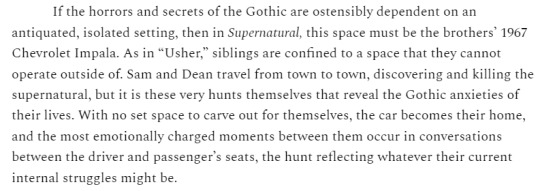
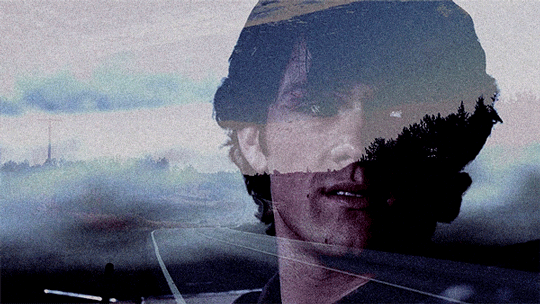
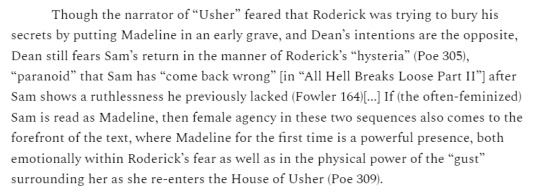


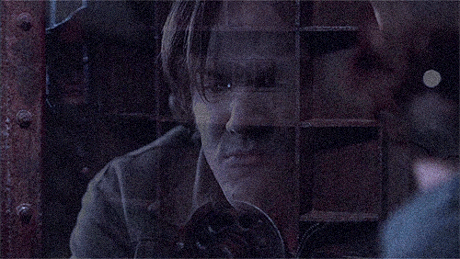

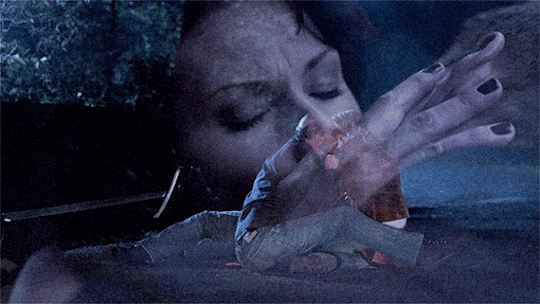

Supernatural (2005-2010) / “'A whole new level of freak:' Supernatural, Poe, and the legacy of the incestuous Gothic" by [redacted]
for @wincestwednesdays
#this is my first time blending gifs be nice to me#my essay. btw. that is a real essay i wrote 4 a class#corespnedit#wincestedit#samdean#comparatives#spn + the gothic#the fall of the house of usher#maven edits#mine#wincestwednesdays#wincest wednesday#spnedit#samdeanedit
384 notes
·
View notes
Text
writing an article on the concept of gothic and the overlap with contemporary aesthetics such as dark academia etc, so listening to some nordic music seems appropriate
and that is why i have no friends bc this is what i do for fun on a saturday night xx
#writers on tumblr#non fiction#gothic#goth#concepts#semiotics#literature#literary studies#literary essay#romanticism and gothic#dark academia#light academia#darkest academia
25 notes
·
View notes
Text
Something I've kind of noticed about a lot of the academic scholarship I've read about Frankenstein / Dracula / Jekyll & Hyde is that everyone just seems to completely dismiss/ignore the characters as actual characters most of the time unless they're the Main Guys. Like, they'll go really in depth about Victor or the Creature's motivations and backstory and spend ages talking about Jekyll's relationship to Hyde and stuff, but the second it comes to characters like Enfield and Elizabeth or Lanyon and Clerval or frankly the Entire Rest of the Cast of Dracula, they just immediately seem uninterested. They'll just sort of vaguely gesture in their direction and go 'Oh yeah X and X thing happens to this character and here's a one sentence summary of their personality which doesn't really matter because this entire cast is interchangeable, anyway, onto the next theme' and half the time their One Sentence is just textually incorrect (looking at the New Woman/Traditional Woman descriptions of Lucy and Mina). And the reason I find this so baffling is because with other analysis I've read (e.g. Great Gatsby stuff) people seem to actually slow down and consider the characterisation and motivations of the cast as a whole with like. Nuance. Like they sit down and treat the characters as multifaceted and complex and having actual relationships with one another, and then you get to these books specifically and no one seems to care? Like they'll go really in depth with various interpretations and historical context for the Big Guys, and then never apply the same sort of examination to anyone else, and if they do, very rarely and probably only for one other character e.g. (Utterson or Mina).
If I had to posit an explanation, I would say its a combination of the archetypal nature of the title characters and the admittedly patchy writing of these books (which arguably lends to their archetypal status). I think academics kind of assume that the primary draw of these books are The Big Guys and the expansive themes and ideas they cover and that everyone else is just a pawn there to enable the narrative around the Big Guys, and the propensity for film adaptations to scrap or rewrite characters probably compounded this impression. And while I think this is at least partly true, the thing is, these characters were not always archetypal Big Guys. They originated in stories alongside *these* other characters *specifically* and it is worth asking what it is about the rest of the cast that makes the story interesting as well. Because, let's be real, if there was approximately no interest in the fucking *narrators* of Dracula, the best friends of Henry Jekyll, or the victims of the Creature, the original readers would have been completely bored out of their minds for most of these novels and public interest in them would not have been as great as it was. All of these novels were stories before they were myths, and academics should not be letting pop culture eclipse them unless they're specifically talking about the relationship between the two.
Overall, I just feel like academics are not only shooting themselves in the foot, but also doing a disservice to these stories by not bothering to investigate the other characters because frankly. It's lazy. It's lazy to dismiss an entire cast and basically skim read any sections involving them just because it's easy to focus on The One Guy. If you people really cared about themes, you'd understand that characters are inextricable from them. Like shit dude I see more care given to characters in essays about Greek tragedies, you guys are waaaay fucking behind
#also when they make character statements it's almost always about external qualities rather than internal thoughts#like in other academic literature i've read people will discusd characters narrative roles#but they'll also point at them and say 'this is x's fatal flaw' or 'y saying this reveals z about their motivations and beliefs'#basically they take a second to view things from a more watsonian perspective alongside doylist analysis#with these books it's just all doylist all the time. it's just 'author wrote U character this way because they were trying to say Q'.#and it gets quite dull. and its also quite presumptuous most of the time because like. You Don't Know Them.#Like yeah they could've been trying to say something or they could have been trying to ingratiate the audience to the character#these aren't essays guys. they're novels.#anyway rant over feel to free to tell me i'm stupid and wrong#dracula#frankenstein or the modern prometheus#dracula novel#strange case of dr jekyll and mr hyde#gothic literature
35 notes
·
View notes
Text
If we put aside the racism, the book Hunchback of Notre Dame (by Hugo) is such a good account of how a teenage girl gets taken advantage of by different adult men who use their experience, their older age, their fame and their power, to use her for sex (Phoebus) or to prey on her and force her to sleep with them, only to kill her when she refuses (Frollo), how married men will see their wives as trophies and objects and will sleep with girls they don't care about (Phoebus again), how that teenage girl grows up in a society that grooms her to think older, powerful men are to be desired, and how Romani teenage girls are eroticized and seen as exotic (which... Hugo himself is guilty of that...).
Disney mostly corrected the racism that was in the book but they completely removed any criticism of heterosexual love that was in it. They could have taken it and gone further and made it feminist, but no, they completely removed it. Now, Esmeralda is an (adult? i sure hope she isn't supposed to be a teenager) hottie who is probably the most sexualized Disney character to have ever existed (like... she does a pole dance then flashes her genitals at Frollo's face) and her relationship with Phoebus is portrayed as pure and healthy (despite their unequal places in society). Hunchback of Notre Dame misses so many marks and could have been so much better than what we've got. I have no idea why Disney decided to adapt that story for their movies and I have no idea why they decided to turn it the way they did
#I've got way more thoughts about Hunchback of Notre Dame#I could write a whole 100 page long essay about it I think lol#as a gothic story lover#as a historian#etc etc#Original post
91 notes
·
View notes
Text
college is fun because i just wrote half a final on nbc hannibal and a full paragraph was about how stabbing is romantic, actually
#hannibal#nbc hannibal#will graham#hannibal lecter#murder husbands#hannigram#finals week#finals#english major#exams#exam week#essays#college#university#gothic
91 notes
·
View notes
Text
thinking about TDP as a piece with gothic leanings. may return to this later
#aka watching a video essay about 'flowers in the attic' and my deep love of the gothic and. yeah#tdp#dragons rambles#prompts#for meta#esp with aaravos
27 notes
·
View notes
Text
youtube
Here is Season One Episode Two - Phantoms of Your Former Self!
I discuss Louis First Night as a Vampire
Louis and Leatats attachment to humanity (Lestats father in the book and how it relates to his love for music in the show . Louis sister in the show and his family in the book)
Louis first Kill - Tractor Man and The Overseer
And the conceptual twist of Louis race interacting with Mr. Carlo and how this change in the show could possibly play homage to the slaves in the book.
Check it out if you’d like! I know it’s long! If you have any criticism or advice on anything please do not hesitate to tell me! I love hearing your thoughts! (:
I also included some throw backs to the 94’ film!
Thank you in advance to anyone who watches/listens to it!
A millions billion times thank you from the bottom of my heart!
Till Next Time! <3
#creative writing#anne rice#fantasy#gothic#gothic fiction#interview with a vampire#lestat de lioncourt#louis de pointe du lac#bailey bass#books and reading#amc interview with the vampire#daniel molloy#assad zaman#black goth#video essay#scriptwriting#sam reid#jacob anderson#season 1#episode 2#youtube#the vampire lestat#iwtv lestat#amc iwtv#iwtv spoilers#iwtv#iwtv fanart#iwtvedit#claudia iwtv#iwtv louis
19 notes
·
View notes
Text
youtube
#another good discussion of the genre#touches on many many different specific stories but doesn't dip into any spoilers#i like the creators style as well‚ not every YouTuber is easy to listen to#midwest gothic#southern gothic#new england gothic#region gothic#liminality#liminal spaces#highways#road trips#alice isn't dead#the left right game#mothman#over the garden wall#get out#the vvitch#salem witch trials#creepy#hauntings#haunted houses#ghost stories#the backroads#strange and unusual#YouTube essays#writing#fiction#Youtube
27 notes
·
View notes
Text
What if I say possesion storylines are secretly about domination and colonialism and the way in which the whims of the capital dictates every single aspect of social relations, and SA, which in turn is also about colonialism
#can you tell i have to hand this essay in two days and im going a bit delulu#my non-college friends tell me people who don't study humanities don't think and talk about their career all the time#apparently they ''don't have marxism-themed parties'' which makes me wonder what possible theme they could be basing their parties off of#do they have like. freud themed parties?? heart surgery themed parties?? gothic architecture themed parties?#it's all about the way the Big Bad Evil (which is the Hegemony) controls EVERYTHING#NOTHING ESCAPES ITS DOMINATION#THE CAPITAL ABSORBS EVERY FORM OF SOCIAL RELATION. YOU CANNOT EXIST OUTSIDE OF IT#EVEN IN THE RARE CASES IN WHICH A FORM OF PRODUCTION MAINTAINS A CERTAIN LEVEL OF AUTONOMY#(by avoiding the appropriation of the surplus value by the Capital. directly selling the produce to it instead)#ALL FORMS OF PRODUCTION MUST BEND TO FULFILL THE CAPITAL'S NEEDS as explained in chapter 6 of the capital#oh in need to find books about marxist fantasy and sci fi sooo bad. my prof insists on the left hand of darkness#so once i finish earthsea i'll see if i can get my hands on it#sa mention cw
18 notes
·
View notes